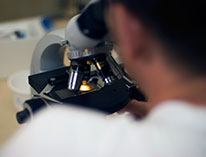Pediatrician Will Continue Leading a NIH-Funded Research Network in Eosinophilic Gastrointestinal Diseases
CU School of Medicine Oct 7, 2019
AURORA, Colo. – A pediatric specialist in eosinophilic gastrointestinal diseases (EGIDs) at the University of Colorado School of Medicine and Children’s Hospital Colorado will continue leading a five-year, $7.75 million clinical research project, a part of the Rare Disease Clinical Research Consortium, recently re-funded by the National Institutes of Health (NIH) (specifically, the National Institute of Allergy and Infectious Diseases, National Center for Advancing Translation Sciences and National Institute of Diabetes and Digestive and Kidney Diseases).
Glenn T. Furuta, MD, professor of pediatrics and director of the Gastrointestinal Eosinophilic Diseases Program at Children’s Hospital Colorado (CHCO), will continue serving as the administrative director and site investigator of the Consortium of Eosinophilic Gastrointestinal Disease Researchers (CEGIR), re-funded by the NIH grant to research eosinophilic gastrointestinal and allergic disorders and to train investigators in how to conduct clinical research.
Dr. Furuta is a member of Digestive Health Institute at CHCO headed by Ron Sokol, MD, the Department of Medicine’s Mucosal Inflammation Program and one of the Dean’s Transformative Grants, the Gastrointestinal and Liver Innate Immunity Program (GALIIP) both of which are directed by Sean Colgan, PhD.
“CEGIR presents an outstanding opportunity for experts from across the world to continue to perform collaborative clinical research and to train a new generation of investigators,” Furuta said. “Research will be guided by patient advocacy groups and results from these studies will bring transformative changes to the care of patients with EGIDs.”
CEGIR’s research is accomplished with a number of colleagues on the Anschutz Medical Campus including Calies Menard-Katcher, MD, Dan Atkins, MD, Paul Menard-Kather, MD,
Kirk Harris, PhD, Joel Friedlander, MD, Pan Zhaozing, MD, Kendra Kocher, Cassandra Burger, Rachel Andrews, Jonathon Cahoon, Meredith Levy and Rhona Jackson.
Eosinophilic gastrointestinal disorders are chronic inflammatory disorders. These conditions are thought to be triggered by allergic hypersensitivity to certain foods and an over-accumulation in the gastrointestinal tract of white blood cells called eosinophils, which are part of the body’s immune system. Eosinophilic disorders can cause a variety of gastrointestinal complaints including reflux-like symptoms, vomiting, difficulty swallowing, tissue scarring, fibrosis, the formation of strictures, diarrhea, abdominal pain, failure to grow in childhood, and other medical complications.
When inflammation is in the esophagus, the condition is known as eosinophilic esophagitis. When it is in the stomach, the condition is called eosinophilic gastritis. When it is in the stomach and either the esophagus and/or intestines, it is called eosinophilic gastroenteritis. When it is in the colon, it is known as eosinophilic colitis. In the previous grant, inflammation in the esophagus, stomach and colon was studied. The new grant will focus on these 3 conditions in addition to eosinophilic gastroenteritis.
Marc Rothenberg, MD, PhD, director of the Cincinnati Center for Eosinophilic Disorders at Cincinnati Children’s Hospital Medical Center, is the principal investigator on the grant and states, “These are painful, chronic diseases that make it difficult and sometimes impossible for individuals to eat many or all foods. I look forward to continuing to advance the understanding and better treatment and of these diseases by collaborating with outstanding researchers, patients and patient advocacy groups, as well as training the next generation of clinicians and researchers who will be experts in these diseases.”
In addition to Dr. Furuta’s and Dr. Rothenberg’s sites, CEGIR includes clinical researchers from Rady Children’s Hospital, Lurie Children’s Hospital, Northwestern University, the National Institutes of Health, Tufts Medical Center, University of North Carolina, Children’s Hospital of Philadelphia, Baylor College of Medicine/Texas Children’s Hospital, Icahn School of Medicine at Mount Sinai, Mayo Clinic, University of Arkansas, University of California, University of Colorado at Denver, University of Illinois, University of Pennsylvania, University of Utah and Bern University Switzerland.
These sites have expertise in relevant clinical specialties, including gastroenterology, allergy, immunology and pathology, and the ability to integrate children and adult patients into the consortium. These sites are considered the major centers working on these diseases, and these sites have access to a comprehensive database of patients.
The CEGIR will also work with patient advocacy groups, including the American Partnership for Eosinophilic Disorders (APFED), the Campaign Urging Research for Eosinophilic Disease (CURED), and the Eosinophilic Family Coalition (EFC), to address the clinical problems of most importance to patients and their families.
